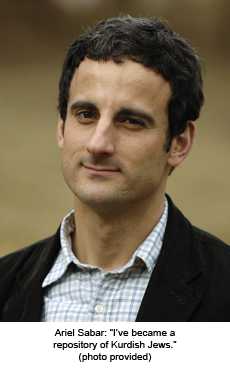Kurdish-Jewish history preserved by author and son of an immigrant.
Rochelle Eisenberg
Staff Writer

When Ariel Sabar was growing up in Los Angeles, he was embarrassed by the exotic ways of his immigrant Kurdish-Jewish father, Dr. Yona Sabar. Dr. Sabar, a professor of Aramaic at the University of California-Los Angeles, was born and raised in the remote northern Iraqi village of Zakho.
Years later, Mr. Sabar decided to travel to Zakho with his father. The result is “My Father’s Paradise: A Son’s Search For His Jewish Past In Kurdish Iraq” (Algonquin Books), winner of the 2008 National Book Critics Circle Award for autobiography.
Next Thursday, May 7, at 7 p.m., Mr. Sabar will speak at the Center for Jewish Education, at 5750 Park Heights Ave., about his book as part of CJE’s “On The Same Page” initiative. The program was piloted two years to bring together Jewish adults to discuss books with Jewish themes.
The BALTIMORE JEWISH TIMES spoke recently with Mr. Sabar. He worked as a journalist for 15 years, including three years as an investigative reporter at the Baltimore Sun.
Why did you write the book?
I was the consummate 1980s L.A. boy. I bought into the L.A. mythology. I boogie-boarded, bought my clothing at a surf shop. As I saw it through a boy’s eyes, my dad didn’t fit in. He didn’t know how to dress, he cut his own hair. I kept him at arm’s length
The turning point in my life was the birth of my own son, Seth, in 2002. When you have your own kid, it changes your perspective of your relationship with your parents. I felt I was unfair to my own father.
I also was drawn to the story about a forgotten-but-ancient group of Jews who were part of the oldest community of the Diaspora.
What was your biggest surprise in Zakho?
I heard that in Kurdistan (sic), the Jews and Muslims got along. I always was skeptical.
People knew immediately we were Jews. The first thing the hosts said was, “Welcome to your home.” They invited us to drink tea and eat elaborate meals. There were still fond memories of Jewish life.
Saddam Hussein tried to rename the Jewish quarter “the Liberated Quarter.” He didn’t want a trace. [After Saddam’s overthrow], my dad’s hometown went back to calling it “the Jewish Quarter.”
What do you see as disheartening today between Jews and Muslims?
People look at Iraq and read the headlines. There is this assumption that this was always the way, that they hated each other all the time. The story of the Kurdish Jews and the Jews in Iraq was that when the Israelites were exiled, they formed a pretty good pluralistic society. There were problems, but nothing of the scale of what was seen in Europe.
What can American Jews learn from the history of the Kurdish Jews?
What we can take away is the value of reaffirming our ties to our families’ histories. One of the themes of the book is that in the face of so much change, what can we hold on to? Make an effort to talk to grandparents, write down or video their stories and discus what it is about the past you want to preserve.
Any stories from people you met on your book tours?
Once or twice, a father of Mideastern background, in one case an Iraqi and in one case even a Kurdish Jew, said to me, “Now I have something to pass on to my child.”
One son said, “I had no idea I had this history. I didn’t realize we had a rich past.”
What also came out of the book tour were documents and memoirs that were given to me. I’ve became a repository of Kurdish Jews. I hope to maintain the e-mails and documents that people sent to me.
What’s your next project?
It was inspired by the story of how my parents met. My father was in his first year in New York and thinking of going back to Israel. America was not what it seemed. He sees a woman entering Washington Square park, taking photos of people who didn’t succeed in America. It reminded him of the Kurds in Israel. He talked to her and they got married four months later.
I want to find other stories of people with strikingly different backgrounds, who happen to meet by chance in New York iconic public places.
Anything else?
A big Iraqi magazine wrote a four-page spread on the book. I have made friends on Facebook with Kurds in Turkey. An Arab radio station did a piece. The book is being translated into Hebrew, to be published later this year or early next year, and the Dutch have bought the rights to the book. You see the way the book is being received by all three faiths. It’s an affirmation.
Source: www.jewishtimes.com, May 1, 2009
